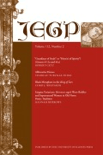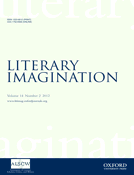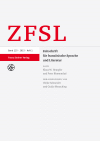
Novyi Filologicheskii Vestnik-New Philological Bulletin
Scope & Guideline
Engaging Minds in the Evolution of Philology
Introduction
Aims and Scopes
- Literary Analysis and Critique:
The journal features critical examinations of various literary works, focusing on thematic, stylistic, and narrative techniques employed by authors across different eras. - Cultural and Folklore Studies:
It explores the rich traditions of folklore, especially within Kalmyk culture, examining how these narratives shape and reflect societal values and historical contexts. - Intertextuality and Literary Connections:
There is a significant emphasis on intertextual analysis, investigating the connections between texts across cultures and time periods to understand their influences and dialogues. - Historical Contextualization:
The journal frequently situates literary works within their historical contexts, analyzing how historical events and cultural shifts influence literary production. - Methodological Innovations in Literary Studies:
It promotes innovative methodologies in literary criticism, including narratology, semiotics, and cognitive poetics, to enhance the understanding of texts.
Trending and Emerging
- Postmodern and Contemporary Literature:
Recent publications increasingly focus on postmodern and contemporary literary works, analyzing their unique narrative structures and thematic preoccupations. - Digital Humanities and Textual Analysis:
There is a growing interest in the application of digital humanities methodologies, including data analysis and computational approaches to literary texts, indicating a trend towards integrating technology with literary studies. - Gender Studies and Feminist Literary Criticism:
Emerging themes in gender studies and feminist critiques are becoming more prominent, focusing on the representation and roles of women in literature. - Cultural Memory and Trauma Studies:
The exploration of cultural memory, particularly in relation to trauma and collective identity in literature, is gaining traction, reflecting current societal concerns. - Globalization and Transnational Literature:
An increasing number of articles are addressing the impacts of globalization on literature, including the study of transnational narratives and cultural exchanges.
Declining or Waning
- Traditional Literary Genres of the Past:
There is a noticeable decrease in the exploration of traditional literary genres that were once prominent, such as classic fairy tales and epic narratives, indicating a shift towards contemporary forms and themes. - Historical Biographies:
Fewer papers delve into biographical studies of historical literary figures, suggesting a waning interest in this approach as more scholars focus on thematic and stylistic analyses instead. - Comparative Literature Studies:
The scope of comparative literature studies, particularly those that focus solely on Western and Russian literature comparisons, seems to be diminishing, with a trend towards more localized analyses. - Soviet-era Literary Criticism:
There is a declining number of publications centered on Soviet-era literary criticism, reflecting a broader move toward contemporary literature and modern critical frameworks. - Pedagogical Approaches to Literature:
Research that examines pedagogical methods in teaching literature appears to be less common, indicating a potential shift away from educational discourse in literary studies.
Similar Journals

ESTUDIOS FILOLOGICOS
Exploring the Depths of Philological InquiryESTUDIOS FILOLOGICOS is a prestigious journal specialized in the fields of Linguistics and Literature, published by UNIV AUSTRAL CHILE. With an ISSN of 0071-1713 and an E-ISSN of 0717-6171, this journal serves as a vital platform for scholars, researchers, and students to disseminate their findings and foster academic discourse in philology and its related disciplines. Renowned for its rigorous peer-review process, ESTUDIOS FILOLOGICOS holds an impressive position with a Q2 ranking in Linguistics and Language and a Q1 ranking in Literature and Literary Theory as of 2023. Situated in Valdivia, Chile, and spanning from 2007 to 2023, this journal not only contributes significantly to the academic community but also engages with diverse voices in the humanities. By maintaining a balanced focus on high-quality research and accessible discourse, ESTUDIOS FILOLOGICOS continues to play an essential role in promoting scholarly information and engagement within the fields of language and literature.

Minerva-Revista de Filologia Clasica
Bridging the past and present through scholarly exchange.Minerva-Revista de Filologia Clasica, an esteemed academic journal published by the Universidad de Valladolid, is a pivotal resource in the fields of Classics, Linguistics, and Literature. With its ISSN 0213-9634 and E-ISSN 2530-6480, this journal has been championing open access since 2017, making high-quality research accessible to a global audience. Based in Valladolid, Spain, Minerva is dedicated to the exploration and dissemination of scholarly work related to classical philology, offering a platform for the exchange of ideas among researchers, educators, and students alike. Recognized in the 2023 category quartiles as Q3 in Classics and Q4 in Linguistics and Language, this journal provides valuable insights and contributes significantly to its fields, allowing authors and readers to engage with important discussions and innovative perspectives. As the academic landscape evolves, Minerva continues to adapt, fostering a vibrant community committed to the advancement of knowledge in antiquity and its linguistic dimensions.

JOURNAL OF ENGLISH AND GERMANIC PHILOLOGY
Advancing Scholarship in English and Germanic StudiesJournal of English and Germanic Philology, published by University of Illinois Press, stands as a prestigious forum for scholarly discourse in the fields of linguistics and literary studies. With its ISSN 0363-6941 and an impressive impact factor aligning it within the Q1 and Q2 quartiles in key academic categories, this journal delves into nuanced explorations of both the English and Germanic languages, enriching the understanding of language and its literary frameworks. The journal aims to foster interdisciplinary dialogue, offering cutting-edge research that appeals not only to linguists and literary theorists but also to educators and cultural historians alike. Although the journal is not open access, its contributions are essential for anyone keen on enhancing their knowledge of linguistic phenomena and literary narratives from these influential linguistic traditions. With a commitment to publishing innovative and rigorous scholarship, the Journal of English and Germanic Philology is a vital resource for academics seeking to advance their work in language and literature.

ANQ-A QUARTERLY JOURNAL OF SHORT ARTICLES NOTES AND REVIEWS
Advancing the Discourse in Cultural Studies and HistoryANQ: A Quarterly Journal of Short Articles, Notes and Reviews is a distinguished publication hosted by Routledge Journals, Taylor & Francis Ltd, and plays a pivotal role in the fields of Cultural Studies, History, and Literature and Literary Theory. Since its inception in 1988, the journal has fostered a dynamic exchange of ideas, featuring concise articles that provide insightful analyses, reviews, and commentary on contemporary issues and historical perspectives, making it an invaluable resource for scholars and practitioners alike. With an impressive ranking within the 89th percentile in Literature and Literary Theory and consistently recognized in the Q2 and Q3 quartiles across key categories, ANQ stands as a testament to rigorous scholarship and innovation in research. While the journal operates under a traditional subscription model, its contributions significantly enrich the academic conversation, fostering insights that resonate across disciplines. Located in Milton Park, Abingdon, United Kingdom, ANQ invites researchers, professionals, and students to delve into its treasure trove of short articles and reviews, thereby enhancing their understanding and appreciation of cultural narratives and literary discourse.

NOVYI MIR
Navigating the Intersection of Thought and LiteratureNOVYI MIR, published by IZD STVO IZVESTIYA, is a distinguished journal that provides a platform for scholarly discourse in the humanities, literature, and cultural studies. With an ISSN of 0130-7673, this journal has made significant contributions to the academic community, particularly within Russia and Eastern Europe. Although it does not currently offer an open access model, its content is revered for its quality and depth, catering to researchers, professionals, and students alike. With a commitment to examining contemporary issues through a literary lens, NOVYI MIR is essential for those seeking to explore the intersection of culture and society. The journal's relevance is underscored by its esteemed reputation in literary circles, making it a vital resource for anyone dedicated to understanding the nuances of Russian literature and thought.

Literary Imagination
Exploring the Depths of Literary CreativityLiterary Imagination, published by Oxford University Press, is an esteemed journal that delves into the intricate world of literature and literary theory. With the ISSN 1523-9012 and the E-ISSN 1752-6566, this journal serves as a pivotal platform for scholars and practitioners in the field, striving to advance the understanding of imaginative literature from various critical perspectives. Boasting a 2023 rank of #751 out of 1106 in the Arts and Humanities category on Scopus, and categorized in the Q3 quartile for literature and literary theory, the journal is recognized for its contribution to the academic discourse. It aims to foster a vibrant academic community through the publication of innovative research, critical essays, and interdisciplinary studies that engage with the complexities of literary creation from 2009 to 2024. While currently not an open access journal, its rich repository of scholarly work remains accessible to researchers, professionals, and students aiming to enrich their understanding of literary narratives and their theoretical frameworks.

Slavia-Casopis pro Slovanskou Filologii
Fostering Innovative Research in Slavic StudiesSlavia-Casopis pro Slovanskou Filologii is an esteemed journal dedicated to the advancement of Slavic philology, published by the SLOVANSKY USTAV AKAD CESKE REPUBLIKY in the heart of the Czech Republic. With its ISSN: 0037-6736, the journal serves as a vital platform for scholarly exchange, embracing a rich academic tradition since its convergence years beginning in 2002. The journal has achieved notable recognition, with a Q3 ranking in Linguistics and Language and a Q2 in Literature and Literary Theory as of 2023, highlighting its contribution to these dynamic fields. Although it does not currently offer open access, its rigorous selection of articles ensures that it remains a crucial resource for researchers and practitioners alike, facilitating a deeper understanding of Slavic languages and literature. Scholars benefit from the journal's extensive research backdrop, enhanced by its current ranks in the Scopus database, underscoring its significant placement within the academic literature landscape. The editorial scope of Slavia promotes innovative inquiries that reflect cultural, historical, and theoretical perspectives endemic to Slavic studies, making it indispensable for professionals, students, and enthusiasts invested in the exploration of Slavic linguistic and literary heritage.

ZEITSCHRIFT FUR FRANZOSISCHE SPRACHE UND LITERATUR
Illuminating the Nuances of French Language and Literary TheoryZEITSCHRIFT FUR FRANZOSISCHE SPRACHE UND LITERATUR, published by FRANZ STEINER VERLAG GMBH, serves as a notable platform for scholarly discourse in the fields of French language and literature. With an ISSN of 0044-2747 and an E-ISSN of 2366-2425, this German journal has established itself as a respected source for researchers, educators, and students alike who seek to deepen their understanding of linguistic and literary theory. Although it currently does not offer Open Access, its rigorous peer-reviewed articles contribute significantly to the discourse of the humanities. Despite its current Q4 ranking in Linguistics and Language, as well as in Literature and Literary Theory, the journal continues to strive towards enriching the academic landscape, encouraging innovative research and interdisciplinary approaches. With a history of converging from 1987, and recent publications making strides from 2018 to 2022, this journal appeals to those interested in exploring the nuances and complexities of French literature and linguistics, making it a valuable resource for advancing knowledge in these fields.

Materiali e Discussioni per l Analisi dei Testi Classici
Exploring the Depths of Classical LiteratureMateriali e Discussioni per l'Analisi dei Testi Classici is a distinguished academic journal published by Fabrizio Serra Editore that focuses on the rich field of Classics and Literature, serving as a vital platform for scholarly discourse and research. Featuring ISSN 0392-6338 and E-ISSN 1724-1693, this journal has been actively publishing since 2009, with a dedicated effort to analyze classical texts and foster critical discussions among academics and students alike. Although the journal operates without an open access model, it is recognized for its significant contributions, evidenced by its ranking in the third quartile (Q3) in both the Classics and Literature categories as of 2023. This places it among the notable outlets for literary and classical scholarship, with Scopus ranks highlighting its ongoing influence in these fields. Based in the heart of Italy, in Pisa, the journal not only enriches the academic community but also provides an essential resource for those engaged in the profound study of classical literature, inviting contributions that challenge and expand current knowledge and methodologies.

Academic Journal of Modern Philology
Unveiling the Rich Tapestry of Language and CultureWelcome to the Academic Journal of Modern Philology, a premier platform dedicated to advancing the field of philology and linguistics. Published by the esteemed Committee Philology Polish Academy of Sciences, Wroclaw Branch, this open-access journal has been committed to disseminating high-quality research since 2014, ensuring widespread access and engagement within the scholarly community. With an ISSN of 2299-7164 and an E-ISSN of 2353-3218, the journal invites contributions that push the boundaries of contemporary philological inquiry, bridging traditional scholarship with modern linguistic challenges. Situated in Poland's vibrant academic milieu, it aims to foster interdisciplinary dialogue while highlighting the importance of philology in understanding cultural and linguistic diversity. Researchers, professionals, and students alike will find a wealth of insightful articles that contribute to the evolving landscape of modern language studies.